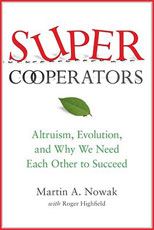"Many of my own collaborations are with people who live on other continents. But because of email, Skype, phone, and so on, it is as if they are sitting in the room next door. My room in the woods of New England is as close to Cambridge as to Roger's home in London or to Hisashi's office in Tokyo. In this way, productive ideas and innovations can spread far and wide. Today, there are innumerable ways by which cooperation can flourish.
"But with new opportunities come new dangers. All my work on the evolution of cooperation hints at one inevitable feature: there is no such thing as utopia and the degree of cooperation in a society will fall as inevitably as it will rise again. With globalization, the planet's resources are becoming exhausted. With globalization, the never-ending competitive quest to achieve economic growth is unsustainable. With globalization comes uniformity too, which makes us more vulnerable to jolts. As has been seen in the financial world, there is no longer safety in investing in diversified American, European, and Asian stocks. They are all interconnected, and when a financial collapse hits one market, they can all plunge into a nosedive. For the same reason, we are more vulnerable to pandemics: thanks to international air travel, a disease can quickly become established and spread around the world.
"We cannot expect cooperation to endure forever. But we can hope to prevent a drastic fall, or at least ensure that cooperation is more likely to prevail over longer periods of time and only suffer the occasional breakdown. We can work to quickly reestablish cooperation after each collapse.
"We need to place more faith in citizens than leaders. Cooperation has to come from the bottom up and not be imposed from the top down. That is why, for example, democracy is a cornerstone concept, since this is a form of cooperation that grows from the roots. We need to do even more to create an environment where cooperation can flourish, if we are to reap its creative benefits.
"Another lesson of my analysis of the mechanisms of cooperation over the years is that we have to learn not to be too inward looking, petty minded, and competitive. When it comes to the structure of society, for example, we have to step out of the narrow confinement of looking after our relatives, or our own kind. Kin selection (even if properly formulated) is only a small component of human cooperation. Nepotism is counterproductive when it comes to cultivating cooperation across wider swaths of society.
"We have to look beyond the narrow idea that punishment and threat can enforce cooperation. In my opinion, creative cooperation can only come from helpful interactions such as participation, friendship, and reward.
"We also discovered how we need to be more open to absorbing the lessons that lie behind the success of other people, rather than focus on our own immediate goals. By adopting the former extrovert strategy, rather than the introvert latter, we can ensure that best practice will become established."
